Adoption and Family Support Programmes: Policy Analysis and Critique
VerifiedAdded on 2022/09/26
|14
|3147
|21
Report
AI Summary
This report provides a comprehensive analysis of adoption and family support programs in Australia. It begins by identifying the key issues and populations affected, focusing on children in need of care and families requiring support. The report examines the roles of different government departments and levels of government involved in these programs. It delves into the policy approaches to adoption and family support, including overviews, key theories of government (welfarism), policy objectives, and key policy documents like the Hague Adoption Convention and the Family Law Act. The report analyzes how these policies are framed in media discussions, critiques their human rights implications, and assesses their effectiveness based on statistical data, such as adoption rates. It also considers situations where these policies are appropriate or inappropriate responses. Furthermore, the report explores the effectiveness of the adoption program in addressing key social issues, and it suggests strategies for advocating for these programs, including referencing human rights legislation and the AASW code of ethics. The conclusion summarizes the findings and emphasizes the importance of these programs for the well-being of children and families.
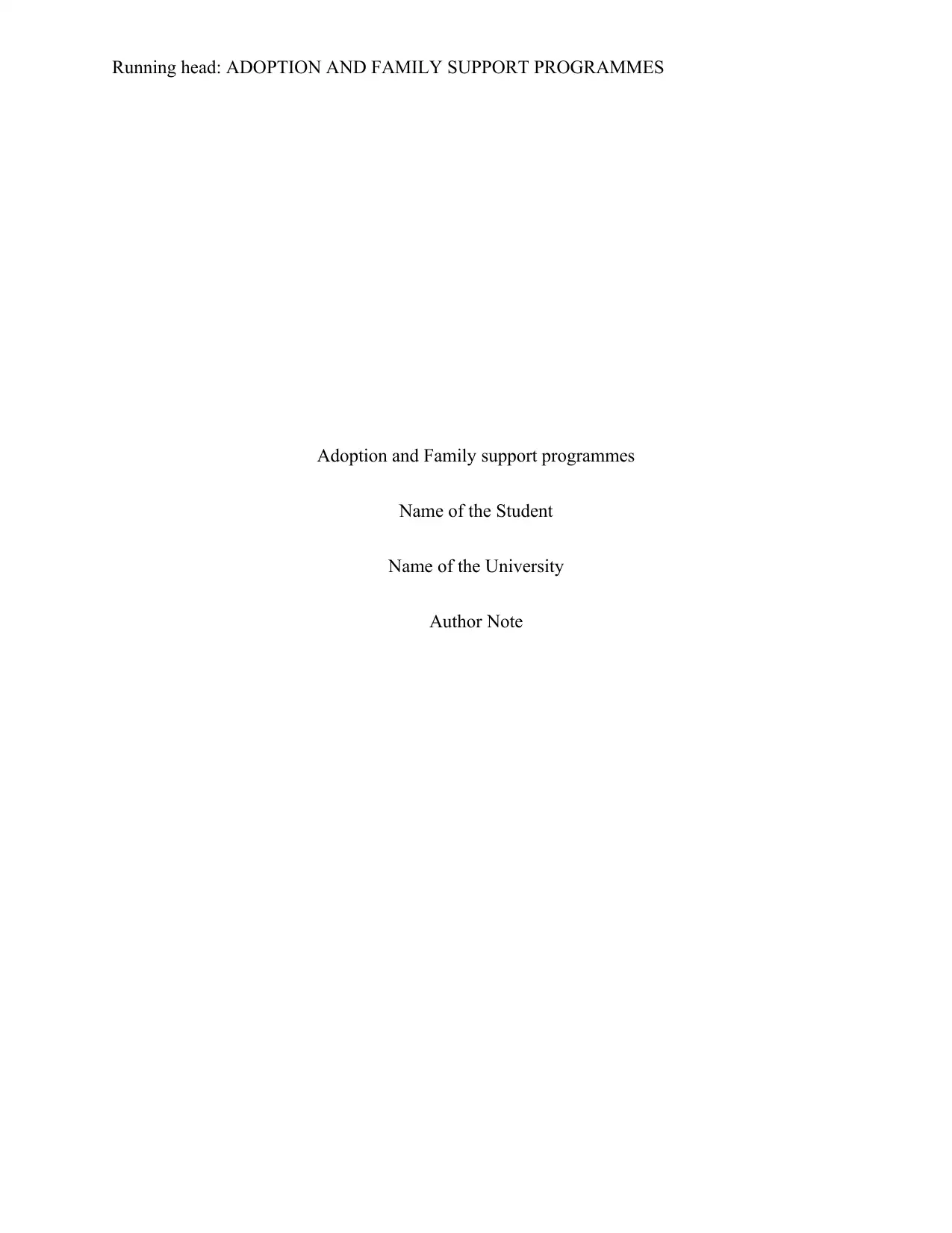
Running head: ADOPTION AND FAMILY SUPPORT PROGRAMMES
Adoption and Family support programmes
Name of the Student
Name of the University
Author Note
Adoption and Family support programmes
Name of the Student
Name of the University
Author Note
Paraphrase This Document
Need a fresh take? Get an instant paraphrase of this document with our AI Paraphraser
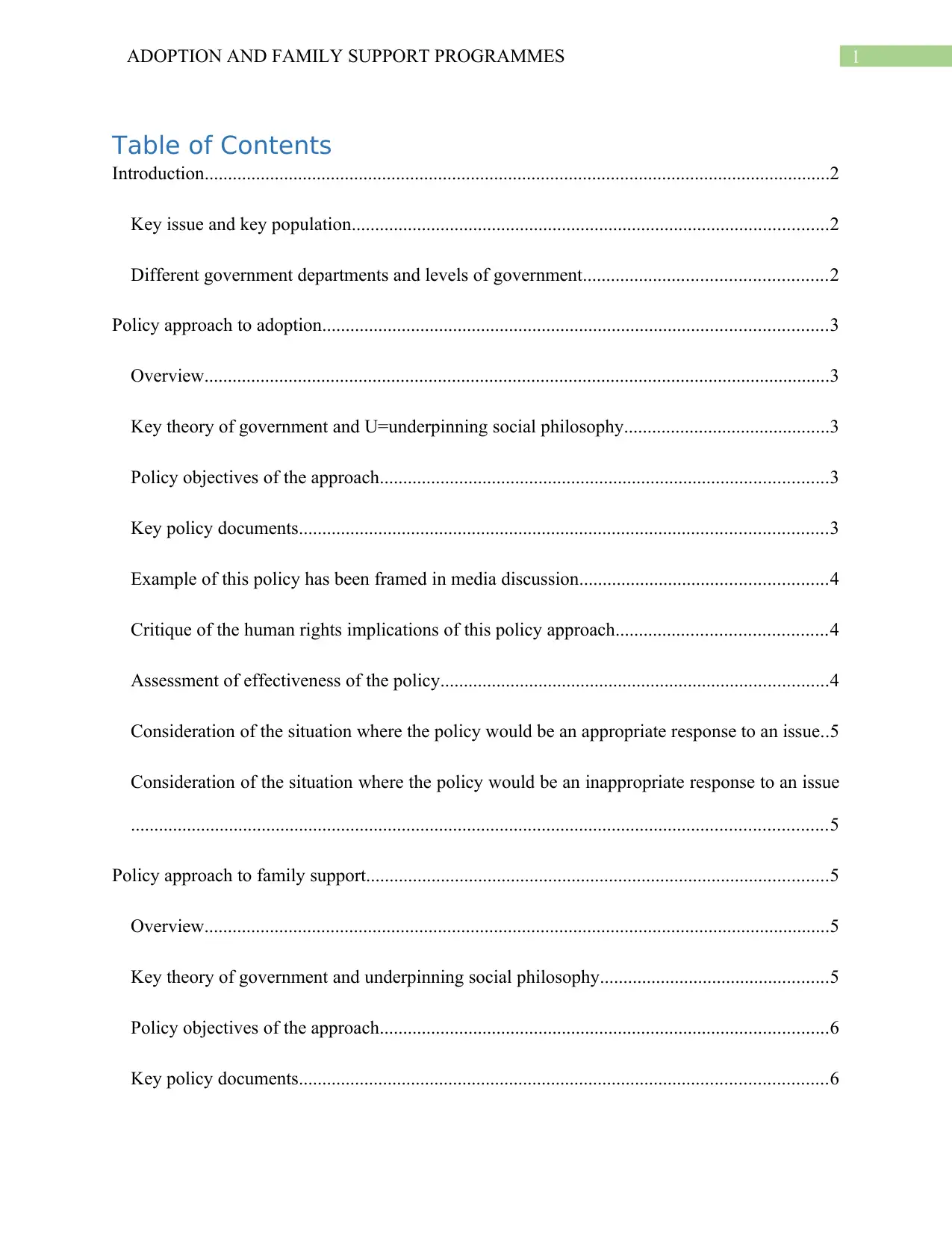
1ADOPTION AND FAMILY SUPPORT PROGRAMMES
Table of Contents
Introduction......................................................................................................................................2
Key issue and key population......................................................................................................2
Different government departments and levels of government....................................................2
Policy approach to adoption............................................................................................................3
Overview......................................................................................................................................3
Key theory of government and U=underpinning social philosophy............................................3
Policy objectives of the approach................................................................................................3
Key policy documents.................................................................................................................3
Example of this policy has been framed in media discussion.....................................................4
Critique of the human rights implications of this policy approach.............................................4
Assessment of effectiveness of the policy...................................................................................4
Consideration of the situation where the policy would be an appropriate response to an issue..5
Consideration of the situation where the policy would be an inappropriate response to an issue
.....................................................................................................................................................5
Policy approach to family support...................................................................................................5
Overview......................................................................................................................................5
Key theory of government and underpinning social philosophy.................................................5
Policy objectives of the approach................................................................................................6
Key policy documents.................................................................................................................6
Table of Contents
Introduction......................................................................................................................................2
Key issue and key population......................................................................................................2
Different government departments and levels of government....................................................2
Policy approach to adoption............................................................................................................3
Overview......................................................................................................................................3
Key theory of government and U=underpinning social philosophy............................................3
Policy objectives of the approach................................................................................................3
Key policy documents.................................................................................................................3
Example of this policy has been framed in media discussion.....................................................4
Critique of the human rights implications of this policy approach.............................................4
Assessment of effectiveness of the policy...................................................................................4
Consideration of the situation where the policy would be an appropriate response to an issue..5
Consideration of the situation where the policy would be an inappropriate response to an issue
.....................................................................................................................................................5
Policy approach to family support...................................................................................................5
Overview......................................................................................................................................5
Key theory of government and underpinning social philosophy.................................................5
Policy objectives of the approach................................................................................................6
Key policy documents.................................................................................................................6
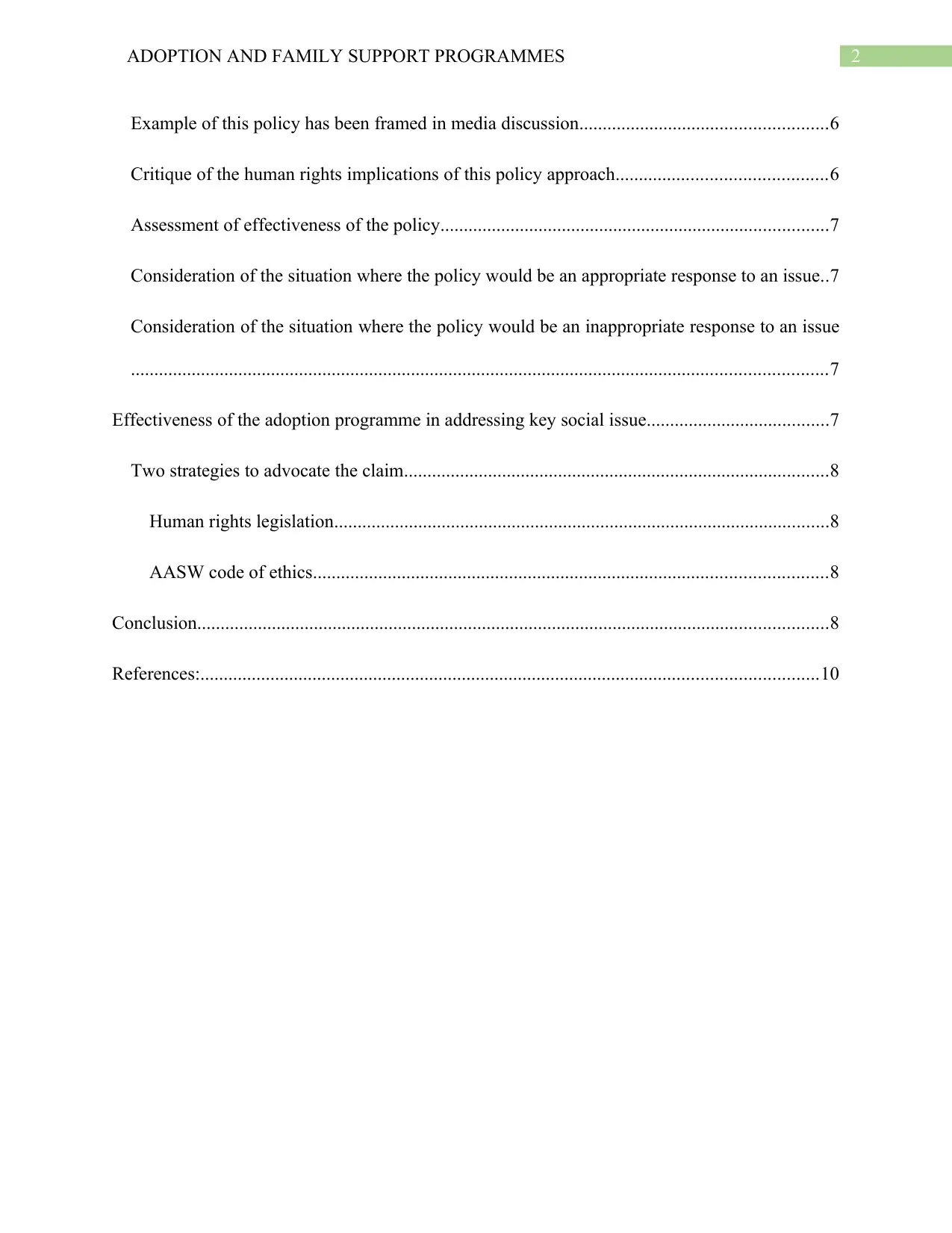
2ADOPTION AND FAMILY SUPPORT PROGRAMMES
Example of this policy has been framed in media discussion.....................................................6
Critique of the human rights implications of this policy approach.............................................6
Assessment of effectiveness of the policy...................................................................................7
Consideration of the situation where the policy would be an appropriate response to an issue..7
Consideration of the situation where the policy would be an inappropriate response to an issue
.....................................................................................................................................................7
Effectiveness of the adoption programme in addressing key social issue.......................................7
Two strategies to advocate the claim...........................................................................................8
Human rights legislation..........................................................................................................8
AASW code of ethics..............................................................................................................8
Conclusion.......................................................................................................................................8
References:....................................................................................................................................10
Example of this policy has been framed in media discussion.....................................................6
Critique of the human rights implications of this policy approach.............................................6
Assessment of effectiveness of the policy...................................................................................7
Consideration of the situation where the policy would be an appropriate response to an issue..7
Consideration of the situation where the policy would be an inappropriate response to an issue
.....................................................................................................................................................7
Effectiveness of the adoption programme in addressing key social issue.......................................7
Two strategies to advocate the claim...........................................................................................8
Human rights legislation..........................................................................................................8
AASW code of ethics..............................................................................................................8
Conclusion.......................................................................................................................................8
References:....................................................................................................................................10
⊘ This is a preview!⊘
Do you want full access?
Subscribe today to unlock all pages.

Trusted by 1+ million students worldwide
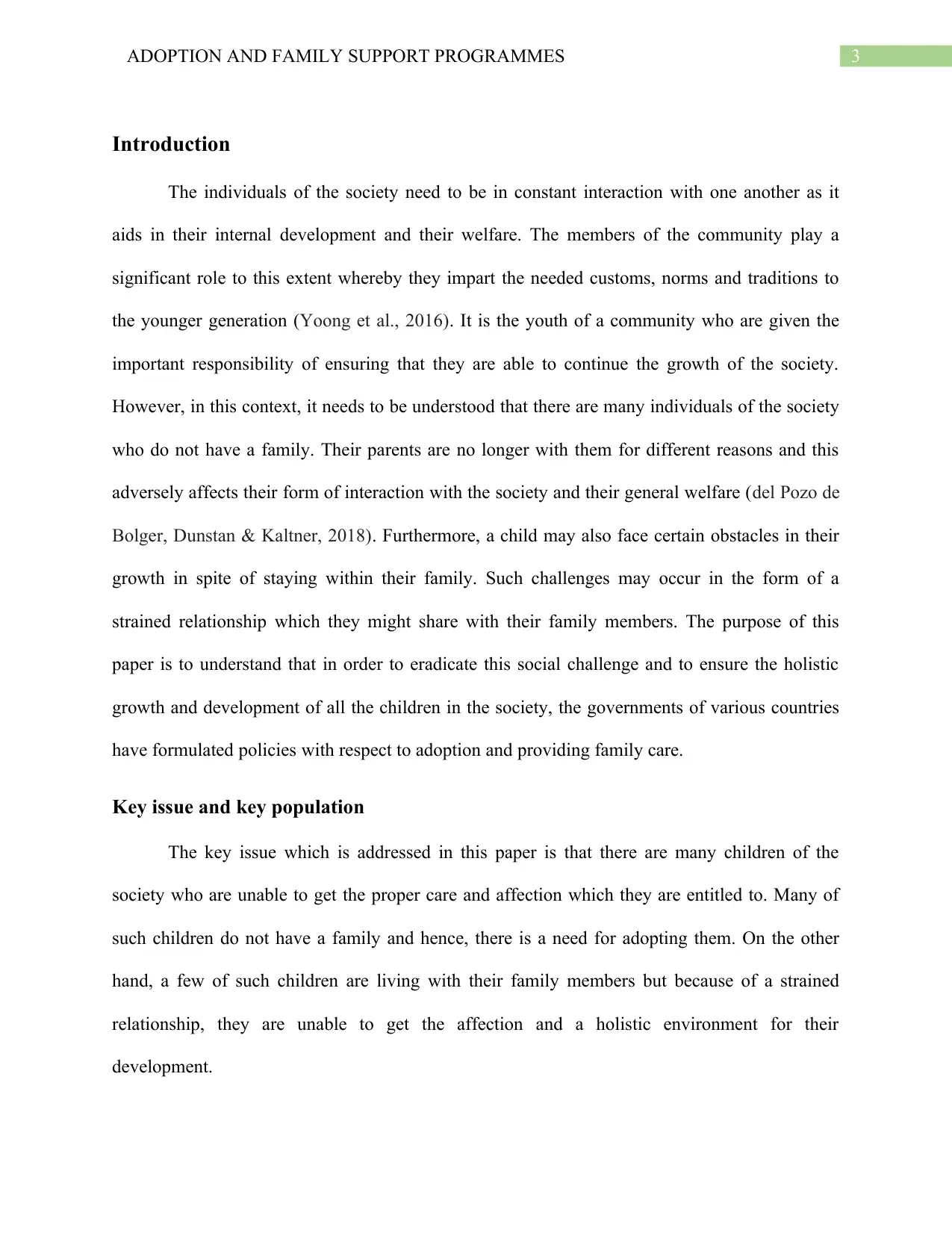
3ADOPTION AND FAMILY SUPPORT PROGRAMMES
Introduction
The individuals of the society need to be in constant interaction with one another as it
aids in their internal development and their welfare. The members of the community play a
significant role to this extent whereby they impart the needed customs, norms and traditions to
the younger generation (Yoong et al., 2016). It is the youth of a community who are given the
important responsibility of ensuring that they are able to continue the growth of the society.
However, in this context, it needs to be understood that there are many individuals of the society
who do not have a family. Their parents are no longer with them for different reasons and this
adversely affects their form of interaction with the society and their general welfare (del Pozo de
Bolger, Dunstan & Kaltner, 2018). Furthermore, a child may also face certain obstacles in their
growth in spite of staying within their family. Such challenges may occur in the form of a
strained relationship which they might share with their family members. The purpose of this
paper is to understand that in order to eradicate this social challenge and to ensure the holistic
growth and development of all the children in the society, the governments of various countries
have formulated policies with respect to adoption and providing family care.
Key issue and key population
The key issue which is addressed in this paper is that there are many children of the
society who are unable to get the proper care and affection which they are entitled to. Many of
such children do not have a family and hence, there is a need for adopting them. On the other
hand, a few of such children are living with their family members but because of a strained
relationship, they are unable to get the affection and a holistic environment for their
development.
Introduction
The individuals of the society need to be in constant interaction with one another as it
aids in their internal development and their welfare. The members of the community play a
significant role to this extent whereby they impart the needed customs, norms and traditions to
the younger generation (Yoong et al., 2016). It is the youth of a community who are given the
important responsibility of ensuring that they are able to continue the growth of the society.
However, in this context, it needs to be understood that there are many individuals of the society
who do not have a family. Their parents are no longer with them for different reasons and this
adversely affects their form of interaction with the society and their general welfare (del Pozo de
Bolger, Dunstan & Kaltner, 2018). Furthermore, a child may also face certain obstacles in their
growth in spite of staying within their family. Such challenges may occur in the form of a
strained relationship which they might share with their family members. The purpose of this
paper is to understand that in order to eradicate this social challenge and to ensure the holistic
growth and development of all the children in the society, the governments of various countries
have formulated policies with respect to adoption and providing family care.
Key issue and key population
The key issue which is addressed in this paper is that there are many children of the
society who are unable to get the proper care and affection which they are entitled to. Many of
such children do not have a family and hence, there is a need for adopting them. On the other
hand, a few of such children are living with their family members but because of a strained
relationship, they are unable to get the affection and a holistic environment for their
development.
Paraphrase This Document
Need a fresh take? Get an instant paraphrase of this document with our AI Paraphraser
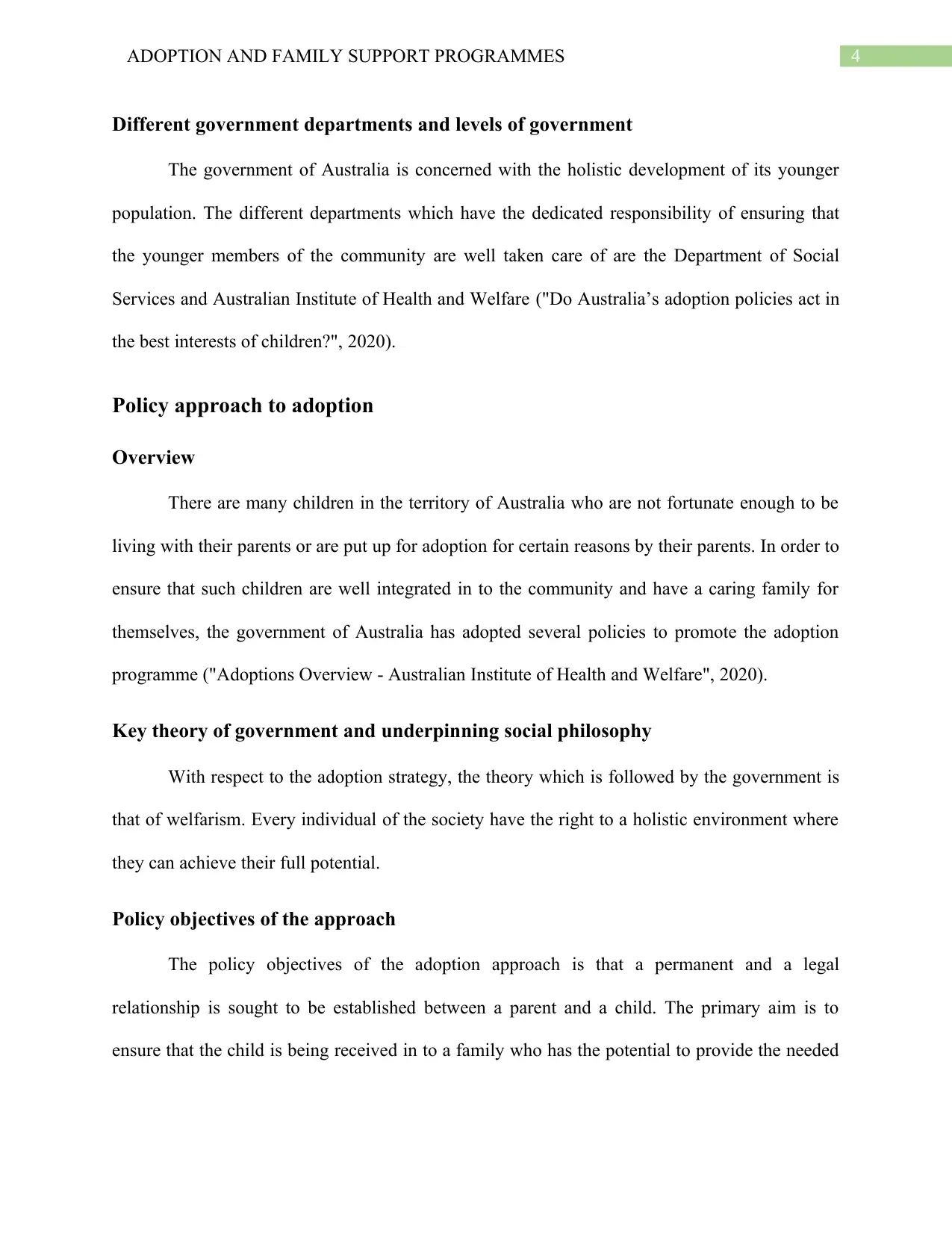
4ADOPTION AND FAMILY SUPPORT PROGRAMMES
Different government departments and levels of government
The government of Australia is concerned with the holistic development of its younger
population. The different departments which have the dedicated responsibility of ensuring that
the younger members of the community are well taken care of are the Department of Social
Services and Australian Institute of Health and Welfare ("Do Australia’s adoption policies act in
the best interests of children?", 2020).
Policy approach to adoption
Overview
There are many children in the territory of Australia who are not fortunate enough to be
living with their parents or are put up for adoption for certain reasons by their parents. In order to
ensure that such children are well integrated in to the community and have a caring family for
themselves, the government of Australia has adopted several policies to promote the adoption
programme ("Adoptions Overview - Australian Institute of Health and Welfare", 2020).
Key theory of government and underpinning social philosophy
With respect to the adoption strategy, the theory which is followed by the government is
that of welfarism. Every individual of the society have the right to a holistic environment where
they can achieve their full potential.
Policy objectives of the approach
The policy objectives of the adoption approach is that a permanent and a legal
relationship is sought to be established between a parent and a child. The primary aim is to
ensure that the child is being received in to a family who has the potential to provide the needed
Different government departments and levels of government
The government of Australia is concerned with the holistic development of its younger
population. The different departments which have the dedicated responsibility of ensuring that
the younger members of the community are well taken care of are the Department of Social
Services and Australian Institute of Health and Welfare ("Do Australia’s adoption policies act in
the best interests of children?", 2020).
Policy approach to adoption
Overview
There are many children in the territory of Australia who are not fortunate enough to be
living with their parents or are put up for adoption for certain reasons by their parents. In order to
ensure that such children are well integrated in to the community and have a caring family for
themselves, the government of Australia has adopted several policies to promote the adoption
programme ("Adoptions Overview - Australian Institute of Health and Welfare", 2020).
Key theory of government and underpinning social philosophy
With respect to the adoption strategy, the theory which is followed by the government is
that of welfarism. Every individual of the society have the right to a holistic environment where
they can achieve their full potential.
Policy objectives of the approach
The policy objectives of the adoption approach is that a permanent and a legal
relationship is sought to be established between a parent and a child. The primary aim is to
ensure that the child is being received in to a family who has the potential to provide the needed
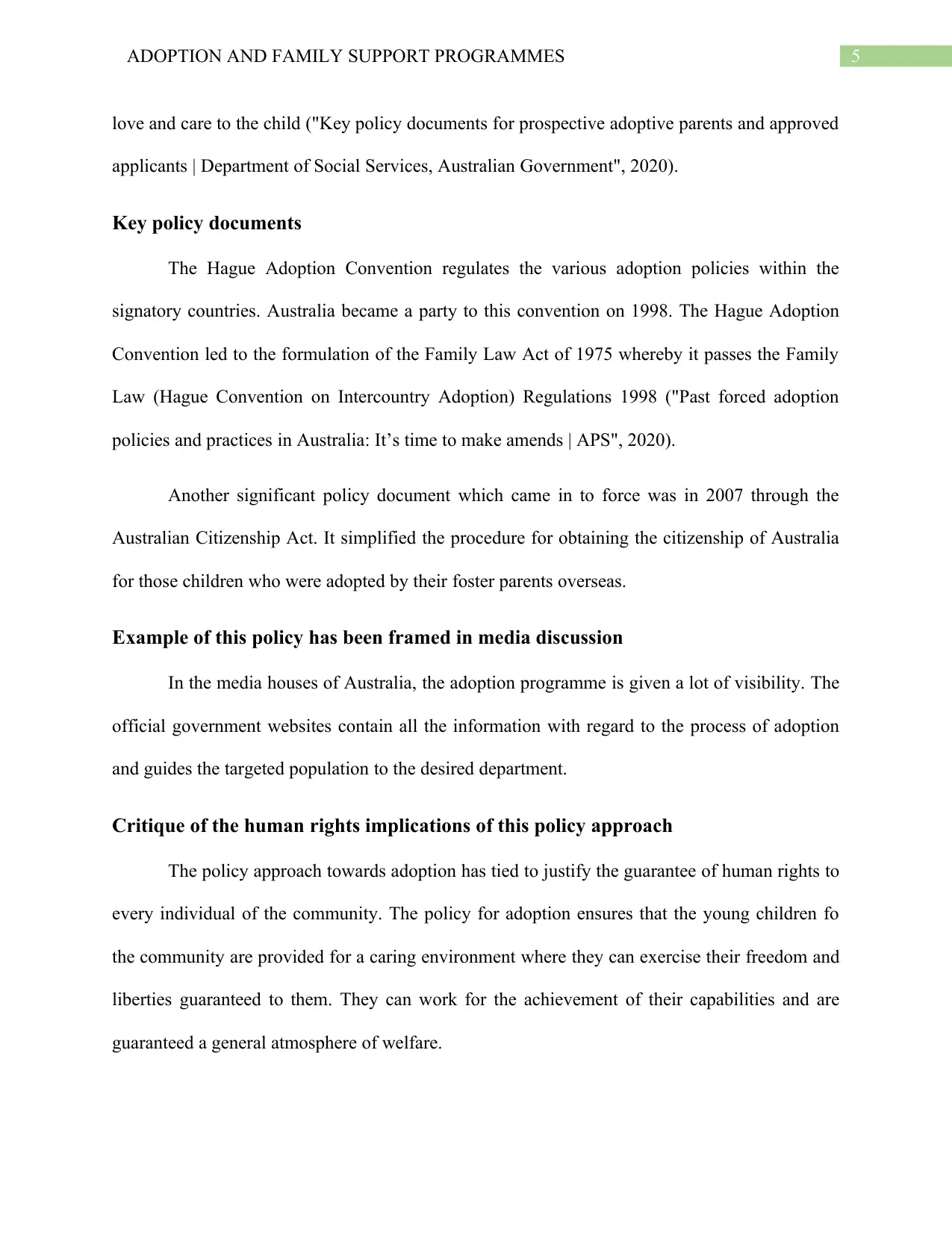
5ADOPTION AND FAMILY SUPPORT PROGRAMMES
love and care to the child ("Key policy documents for prospective adoptive parents and approved
applicants | Department of Social Services, Australian Government", 2020).
Key policy documents
The Hague Adoption Convention regulates the various adoption policies within the
signatory countries. Australia became a party to this convention on 1998. The Hague Adoption
Convention led to the formulation of the Family Law Act of 1975 whereby it passes the Family
Law (Hague Convention on Intercountry Adoption) Regulations 1998 ("Past forced adoption
policies and practices in Australia: It’s time to make amends | APS", 2020).
Another significant policy document which came in to force was in 2007 through the
Australian Citizenship Act. It simplified the procedure for obtaining the citizenship of Australia
for those children who were adopted by their foster parents overseas.
Example of this policy has been framed in media discussion
In the media houses of Australia, the adoption programme is given a lot of visibility. The
official government websites contain all the information with regard to the process of adoption
and guides the targeted population to the desired department.
Critique of the human rights implications of this policy approach
The policy approach towards adoption has tied to justify the guarantee of human rights to
every individual of the community. The policy for adoption ensures that the young children fo
the community are provided for a caring environment where they can exercise their freedom and
liberties guaranteed to them. They can work for the achievement of their capabilities and are
guaranteed a general atmosphere of welfare.
love and care to the child ("Key policy documents for prospective adoptive parents and approved
applicants | Department of Social Services, Australian Government", 2020).
Key policy documents
The Hague Adoption Convention regulates the various adoption policies within the
signatory countries. Australia became a party to this convention on 1998. The Hague Adoption
Convention led to the formulation of the Family Law Act of 1975 whereby it passes the Family
Law (Hague Convention on Intercountry Adoption) Regulations 1998 ("Past forced adoption
policies and practices in Australia: It’s time to make amends | APS", 2020).
Another significant policy document which came in to force was in 2007 through the
Australian Citizenship Act. It simplified the procedure for obtaining the citizenship of Australia
for those children who were adopted by their foster parents overseas.
Example of this policy has been framed in media discussion
In the media houses of Australia, the adoption programme is given a lot of visibility. The
official government websites contain all the information with regard to the process of adoption
and guides the targeted population to the desired department.
Critique of the human rights implications of this policy approach
The policy approach towards adoption has tied to justify the guarantee of human rights to
every individual of the community. The policy for adoption ensures that the young children fo
the community are provided for a caring environment where they can exercise their freedom and
liberties guaranteed to them. They can work for the achievement of their capabilities and are
guaranteed a general atmosphere of welfare.
⊘ This is a preview!⊘
Do you want full access?
Subscribe today to unlock all pages.

Trusted by 1+ million students worldwide
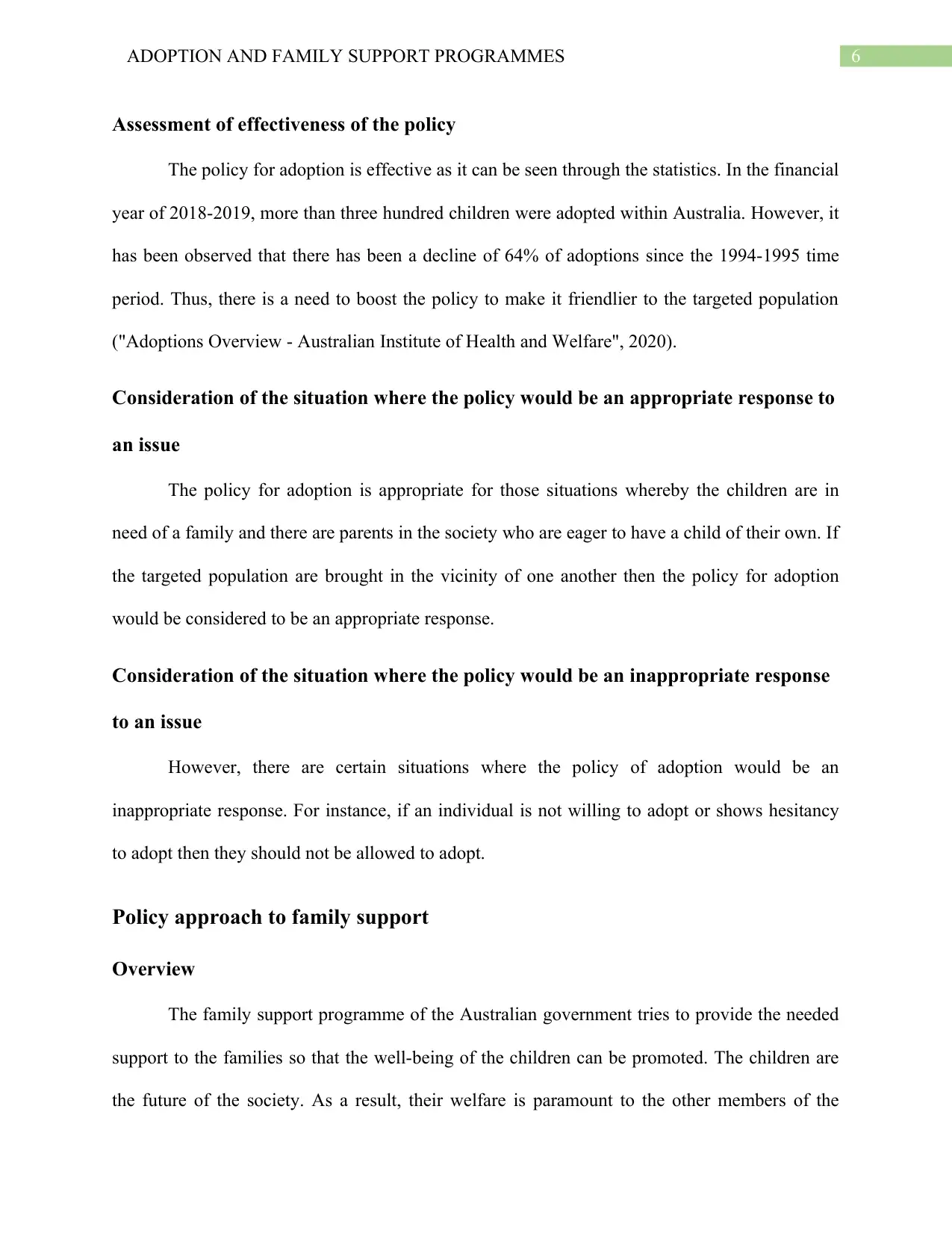
6ADOPTION AND FAMILY SUPPORT PROGRAMMES
Assessment of effectiveness of the policy
The policy for adoption is effective as it can be seen through the statistics. In the financial
year of 2018-2019, more than three hundred children were adopted within Australia. However, it
has been observed that there has been a decline of 64% of adoptions since the 1994-1995 time
period. Thus, there is a need to boost the policy to make it friendlier to the targeted population
("Adoptions Overview - Australian Institute of Health and Welfare", 2020).
Consideration of the situation where the policy would be an appropriate response to
an issue
The policy for adoption is appropriate for those situations whereby the children are in
need of a family and there are parents in the society who are eager to have a child of their own. If
the targeted population are brought in the vicinity of one another then the policy for adoption
would be considered to be an appropriate response.
Consideration of the situation where the policy would be an inappropriate response
to an issue
However, there are certain situations where the policy of adoption would be an
inappropriate response. For instance, if an individual is not willing to adopt or shows hesitancy
to adopt then they should not be allowed to adopt.
Policy approach to family support
Overview
The family support programme of the Australian government tries to provide the needed
support to the families so that the well-being of the children can be promoted. The children are
the future of the society. As a result, their welfare is paramount to the other members of the
Assessment of effectiveness of the policy
The policy for adoption is effective as it can be seen through the statistics. In the financial
year of 2018-2019, more than three hundred children were adopted within Australia. However, it
has been observed that there has been a decline of 64% of adoptions since the 1994-1995 time
period. Thus, there is a need to boost the policy to make it friendlier to the targeted population
("Adoptions Overview - Australian Institute of Health and Welfare", 2020).
Consideration of the situation where the policy would be an appropriate response to
an issue
The policy for adoption is appropriate for those situations whereby the children are in
need of a family and there are parents in the society who are eager to have a child of their own. If
the targeted population are brought in the vicinity of one another then the policy for adoption
would be considered to be an appropriate response.
Consideration of the situation where the policy would be an inappropriate response
to an issue
However, there are certain situations where the policy of adoption would be an
inappropriate response. For instance, if an individual is not willing to adopt or shows hesitancy
to adopt then they should not be allowed to adopt.
Policy approach to family support
Overview
The family support programme of the Australian government tries to provide the needed
support to the families so that the well-being of the children can be promoted. The children are
the future of the society. As a result, their welfare is paramount to the other members of the
Paraphrase This Document
Need a fresh take? Get an instant paraphrase of this document with our AI Paraphraser
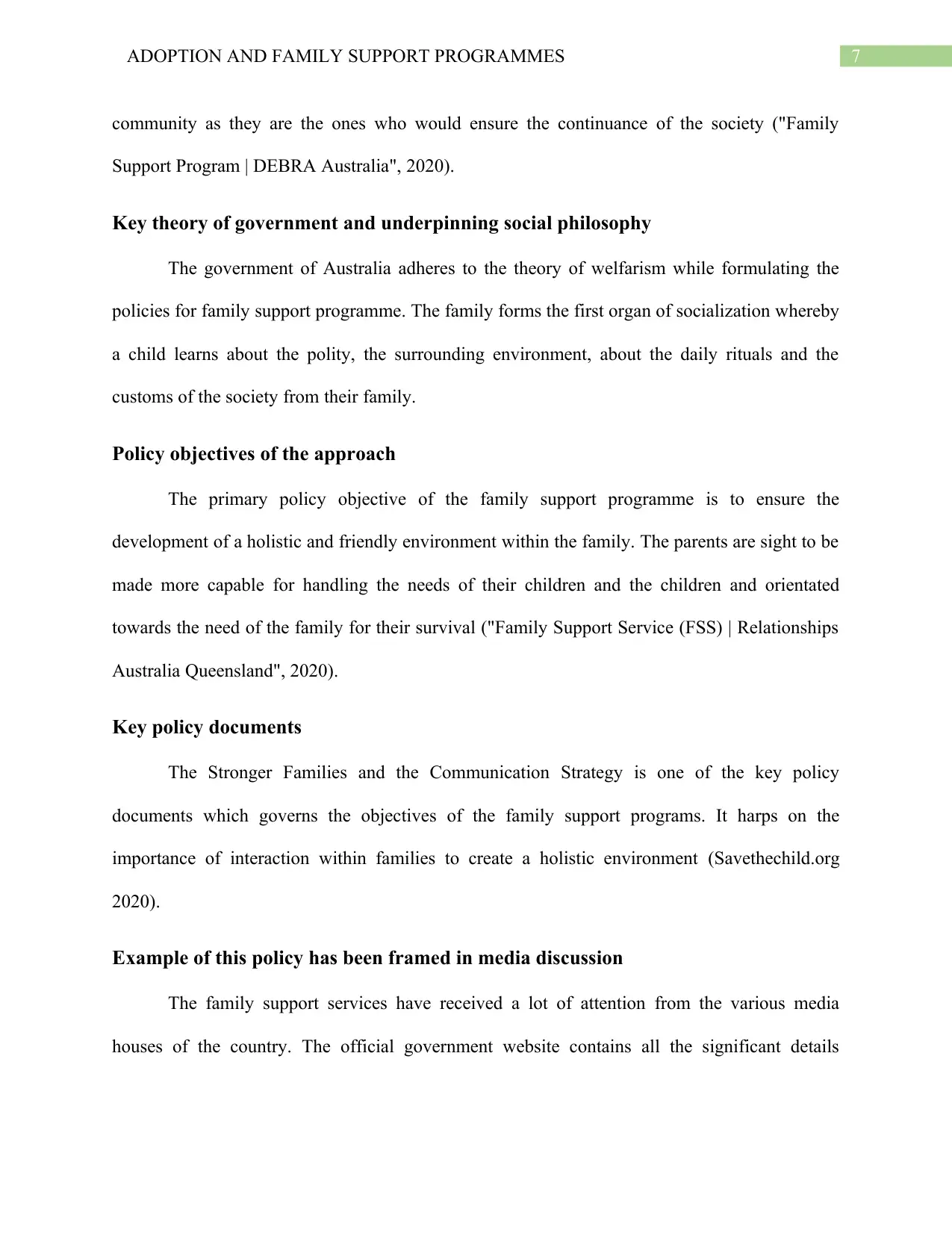
7ADOPTION AND FAMILY SUPPORT PROGRAMMES
community as they are the ones who would ensure the continuance of the society ("Family
Support Program | DEBRA Australia", 2020).
Key theory of government and underpinning social philosophy
The government of Australia adheres to the theory of welfarism while formulating the
policies for family support programme. The family forms the first organ of socialization whereby
a child learns about the polity, the surrounding environment, about the daily rituals and the
customs of the society from their family.
Policy objectives of the approach
The primary policy objective of the family support programme is to ensure the
development of a holistic and friendly environment within the family. The parents are sight to be
made more capable for handling the needs of their children and the children and orientated
towards the need of the family for their survival ("Family Support Service (FSS) | Relationships
Australia Queensland", 2020).
Key policy documents
The Stronger Families and the Communication Strategy is one of the key policy
documents which governs the objectives of the family support programs. It harps on the
importance of interaction within families to create a holistic environment (Savethechild.org
2020).
Example of this policy has been framed in media discussion
The family support services have received a lot of attention from the various media
houses of the country. The official government website contains all the significant details
community as they are the ones who would ensure the continuance of the society ("Family
Support Program | DEBRA Australia", 2020).
Key theory of government and underpinning social philosophy
The government of Australia adheres to the theory of welfarism while formulating the
policies for family support programme. The family forms the first organ of socialization whereby
a child learns about the polity, the surrounding environment, about the daily rituals and the
customs of the society from their family.
Policy objectives of the approach
The primary policy objective of the family support programme is to ensure the
development of a holistic and friendly environment within the family. The parents are sight to be
made more capable for handling the needs of their children and the children and orientated
towards the need of the family for their survival ("Family Support Service (FSS) | Relationships
Australia Queensland", 2020).
Key policy documents
The Stronger Families and the Communication Strategy is one of the key policy
documents which governs the objectives of the family support programs. It harps on the
importance of interaction within families to create a holistic environment (Savethechild.org
2020).
Example of this policy has been framed in media discussion
The family support services have received a lot of attention from the various media
houses of the country. The official government website contains all the significant details
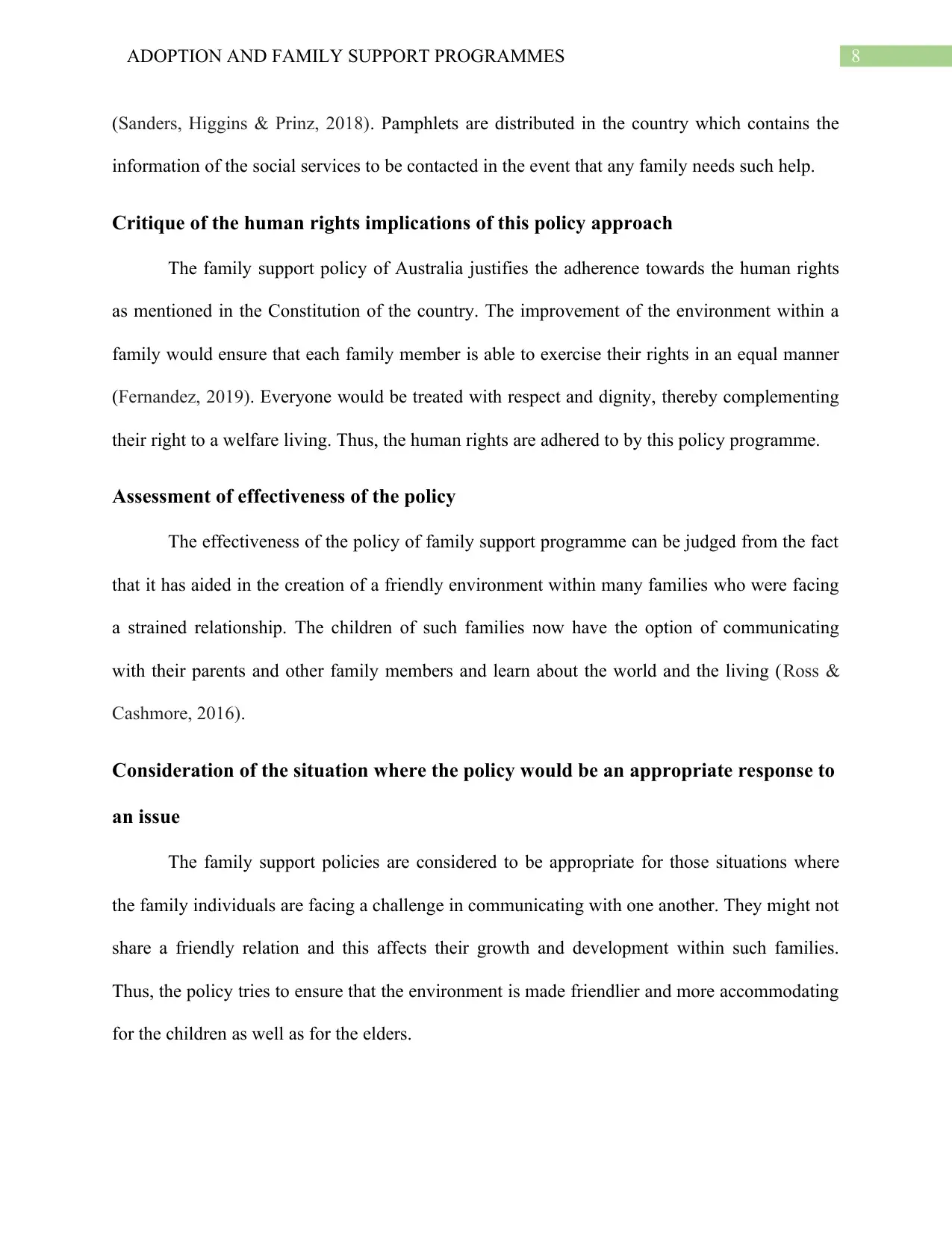
8ADOPTION AND FAMILY SUPPORT PROGRAMMES
(Sanders, Higgins & Prinz, 2018). Pamphlets are distributed in the country which contains the
information of the social services to be contacted in the event that any family needs such help.
Critique of the human rights implications of this policy approach
The family support policy of Australia justifies the adherence towards the human rights
as mentioned in the Constitution of the country. The improvement of the environment within a
family would ensure that each family member is able to exercise their rights in an equal manner
(Fernandez, 2019). Everyone would be treated with respect and dignity, thereby complementing
their right to a welfare living. Thus, the human rights are adhered to by this policy programme.
Assessment of effectiveness of the policy
The effectiveness of the policy of family support programme can be judged from the fact
that it has aided in the creation of a friendly environment within many families who were facing
a strained relationship. The children of such families now have the option of communicating
with their parents and other family members and learn about the world and the living (Ross &
Cashmore, 2016).
Consideration of the situation where the policy would be an appropriate response to
an issue
The family support policies are considered to be appropriate for those situations where
the family individuals are facing a challenge in communicating with one another. They might not
share a friendly relation and this affects their growth and development within such families.
Thus, the policy tries to ensure that the environment is made friendlier and more accommodating
for the children as well as for the elders.
(Sanders, Higgins & Prinz, 2018). Pamphlets are distributed in the country which contains the
information of the social services to be contacted in the event that any family needs such help.
Critique of the human rights implications of this policy approach
The family support policy of Australia justifies the adherence towards the human rights
as mentioned in the Constitution of the country. The improvement of the environment within a
family would ensure that each family member is able to exercise their rights in an equal manner
(Fernandez, 2019). Everyone would be treated with respect and dignity, thereby complementing
their right to a welfare living. Thus, the human rights are adhered to by this policy programme.
Assessment of effectiveness of the policy
The effectiveness of the policy of family support programme can be judged from the fact
that it has aided in the creation of a friendly environment within many families who were facing
a strained relationship. The children of such families now have the option of communicating
with their parents and other family members and learn about the world and the living (Ross &
Cashmore, 2016).
Consideration of the situation where the policy would be an appropriate response to
an issue
The family support policies are considered to be appropriate for those situations where
the family individuals are facing a challenge in communicating with one another. They might not
share a friendly relation and this affects their growth and development within such families.
Thus, the policy tries to ensure that the environment is made friendlier and more accommodating
for the children as well as for the elders.
⊘ This is a preview!⊘
Do you want full access?
Subscribe today to unlock all pages.

Trusted by 1+ million students worldwide
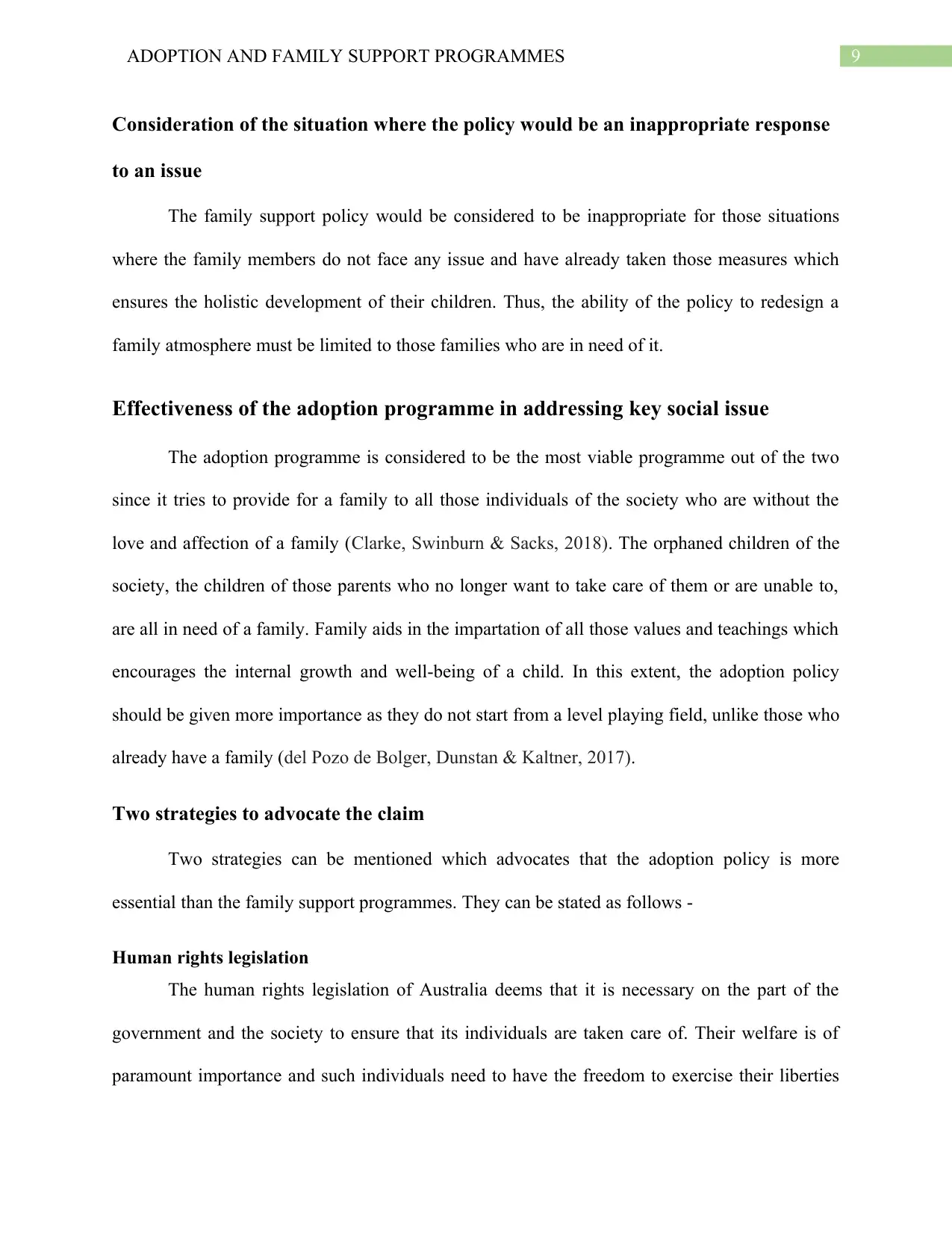
9ADOPTION AND FAMILY SUPPORT PROGRAMMES
Consideration of the situation where the policy would be an inappropriate response
to an issue
The family support policy would be considered to be inappropriate for those situations
where the family members do not face any issue and have already taken those measures which
ensures the holistic development of their children. Thus, the ability of the policy to redesign a
family atmosphere must be limited to those families who are in need of it.
Effectiveness of the adoption programme in addressing key social issue
The adoption programme is considered to be the most viable programme out of the two
since it tries to provide for a family to all those individuals of the society who are without the
love and affection of a family (Clarke, Swinburn & Sacks, 2018). The orphaned children of the
society, the children of those parents who no longer want to take care of them or are unable to,
are all in need of a family. Family aids in the impartation of all those values and teachings which
encourages the internal growth and well-being of a child. In this extent, the adoption policy
should be given more importance as they do not start from a level playing field, unlike those who
already have a family (del Pozo de Bolger, Dunstan & Kaltner, 2017).
Two strategies to advocate the claim
Two strategies can be mentioned which advocates that the adoption policy is more
essential than the family support programmes. They can be stated as follows -
Human rights legislation
The human rights legislation of Australia deems that it is necessary on the part of the
government and the society to ensure that its individuals are taken care of. Their welfare is of
paramount importance and such individuals need to have the freedom to exercise their liberties
Consideration of the situation where the policy would be an inappropriate response
to an issue
The family support policy would be considered to be inappropriate for those situations
where the family members do not face any issue and have already taken those measures which
ensures the holistic development of their children. Thus, the ability of the policy to redesign a
family atmosphere must be limited to those families who are in need of it.
Effectiveness of the adoption programme in addressing key social issue
The adoption programme is considered to be the most viable programme out of the two
since it tries to provide for a family to all those individuals of the society who are without the
love and affection of a family (Clarke, Swinburn & Sacks, 2018). The orphaned children of the
society, the children of those parents who no longer want to take care of them or are unable to,
are all in need of a family. Family aids in the impartation of all those values and teachings which
encourages the internal growth and well-being of a child. In this extent, the adoption policy
should be given more importance as they do not start from a level playing field, unlike those who
already have a family (del Pozo de Bolger, Dunstan & Kaltner, 2017).
Two strategies to advocate the claim
Two strategies can be mentioned which advocates that the adoption policy is more
essential than the family support programmes. They can be stated as follows -
Human rights legislation
The human rights legislation of Australia deems that it is necessary on the part of the
government and the society to ensure that its individuals are taken care of. Their welfare is of
paramount importance and such individuals need to have the freedom to exercise their liberties
Paraphrase This Document
Need a fresh take? Get an instant paraphrase of this document with our AI Paraphraser
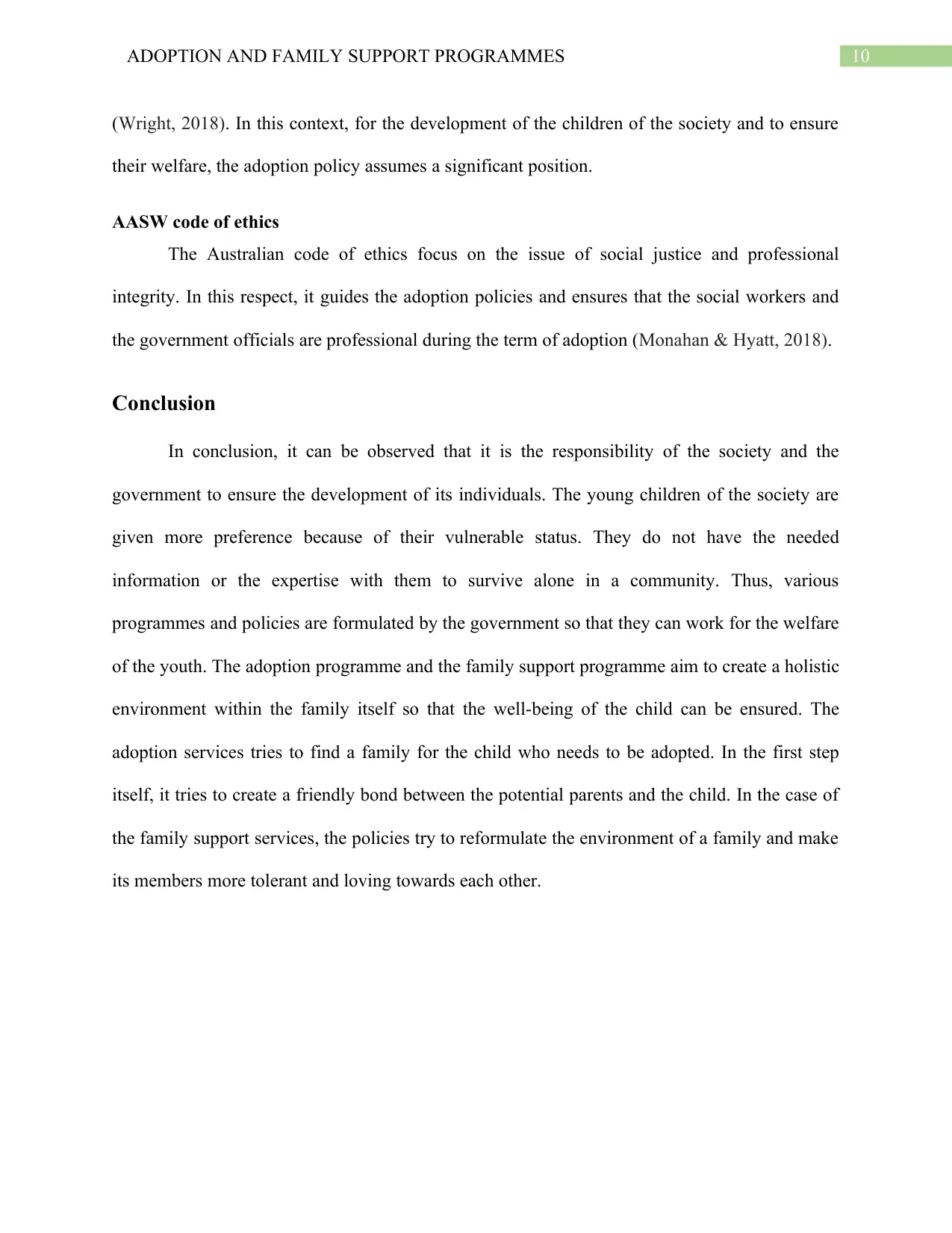
10ADOPTION AND FAMILY SUPPORT PROGRAMMES
(Wright, 2018). In this context, for the development of the children of the society and to ensure
their welfare, the adoption policy assumes a significant position.
AASW code of ethics
The Australian code of ethics focus on the issue of social justice and professional
integrity. In this respect, it guides the adoption policies and ensures that the social workers and
the government officials are professional during the term of adoption (Monahan & Hyatt, 2018).
Conclusion
In conclusion, it can be observed that it is the responsibility of the society and the
government to ensure the development of its individuals. The young children of the society are
given more preference because of their vulnerable status. They do not have the needed
information or the expertise with them to survive alone in a community. Thus, various
programmes and policies are formulated by the government so that they can work for the welfare
of the youth. The adoption programme and the family support programme aim to create a holistic
environment within the family itself so that the well-being of the child can be ensured. The
adoption services tries to find a family for the child who needs to be adopted. In the first step
itself, it tries to create a friendly bond between the potential parents and the child. In the case of
the family support services, the policies try to reformulate the environment of a family and make
its members more tolerant and loving towards each other.
(Wright, 2018). In this context, for the development of the children of the society and to ensure
their welfare, the adoption policy assumes a significant position.
AASW code of ethics
The Australian code of ethics focus on the issue of social justice and professional
integrity. In this respect, it guides the adoption policies and ensures that the social workers and
the government officials are professional during the term of adoption (Monahan & Hyatt, 2018).
Conclusion
In conclusion, it can be observed that it is the responsibility of the society and the
government to ensure the development of its individuals. The young children of the society are
given more preference because of their vulnerable status. They do not have the needed
information or the expertise with them to survive alone in a community. Thus, various
programmes and policies are formulated by the government so that they can work for the welfare
of the youth. The adoption programme and the family support programme aim to create a holistic
environment within the family itself so that the well-being of the child can be ensured. The
adoption services tries to find a family for the child who needs to be adopted. In the first step
itself, it tries to create a friendly bond between the potential parents and the child. In the case of
the family support services, the policies try to reformulate the environment of a family and make
its members more tolerant and loving towards each other.
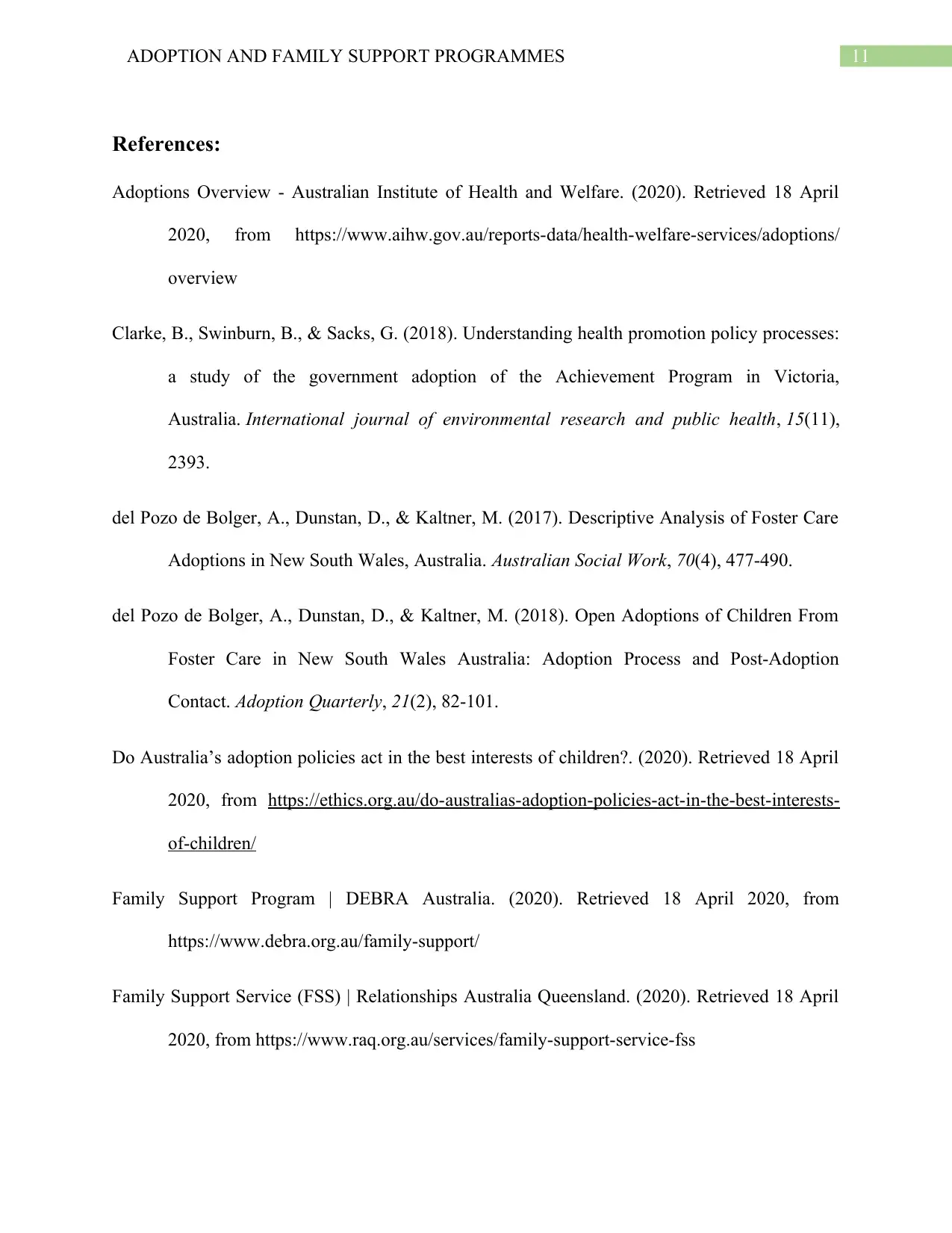
11ADOPTION AND FAMILY SUPPORT PROGRAMMES
References:
Adoptions Overview - Australian Institute of Health and Welfare. (2020). Retrieved 18 April
2020, from https://www.aihw.gov.au/reports-data/health-welfare-services/adoptions/
overview
Clarke, B., Swinburn, B., & Sacks, G. (2018). Understanding health promotion policy processes:
a study of the government adoption of the Achievement Program in Victoria,
Australia. International journal of environmental research and public health, 15(11),
2393.
del Pozo de Bolger, A., Dunstan, D., & Kaltner, M. (2017). Descriptive Analysis of Foster Care
Adoptions in New South Wales, Australia. Australian Social Work, 70(4), 477-490.
del Pozo de Bolger, A., Dunstan, D., & Kaltner, M. (2018). Open Adoptions of Children From
Foster Care in New South Wales Australia: Adoption Process and Post-Adoption
Contact. Adoption Quarterly, 21(2), 82-101.
Do Australia’s adoption policies act in the best interests of children?. (2020). Retrieved 18 April
2020, from https://ethics.org.au/do-australias-adoption-policies-act-in-the-best-interests-
of-children/
Family Support Program | DEBRA Australia. (2020). Retrieved 18 April 2020, from
https://www.debra.org.au/family-support/
Family Support Service (FSS) | Relationships Australia Queensland. (2020). Retrieved 18 April
2020, from https://www.raq.org.au/services/family-support-service-fss
References:
Adoptions Overview - Australian Institute of Health and Welfare. (2020). Retrieved 18 April
2020, from https://www.aihw.gov.au/reports-data/health-welfare-services/adoptions/
overview
Clarke, B., Swinburn, B., & Sacks, G. (2018). Understanding health promotion policy processes:
a study of the government adoption of the Achievement Program in Victoria,
Australia. International journal of environmental research and public health, 15(11),
2393.
del Pozo de Bolger, A., Dunstan, D., & Kaltner, M. (2017). Descriptive Analysis of Foster Care
Adoptions in New South Wales, Australia. Australian Social Work, 70(4), 477-490.
del Pozo de Bolger, A., Dunstan, D., & Kaltner, M. (2018). Open Adoptions of Children From
Foster Care in New South Wales Australia: Adoption Process and Post-Adoption
Contact. Adoption Quarterly, 21(2), 82-101.
Do Australia’s adoption policies act in the best interests of children?. (2020). Retrieved 18 April
2020, from https://ethics.org.au/do-australias-adoption-policies-act-in-the-best-interests-
of-children/
Family Support Program | DEBRA Australia. (2020). Retrieved 18 April 2020, from
https://www.debra.org.au/family-support/
Family Support Service (FSS) | Relationships Australia Queensland. (2020). Retrieved 18 April
2020, from https://www.raq.org.au/services/family-support-service-fss
⊘ This is a preview!⊘
Do you want full access?
Subscribe today to unlock all pages.

Trusted by 1+ million students worldwide
1 out of 14
Related Documents
Your All-in-One AI-Powered Toolkit for Academic Success.
+13062052269
info@desklib.com
Available 24*7 on WhatsApp / Email
![[object Object]](/_next/static/media/star-bottom.7253800d.svg)
Unlock your academic potential
Copyright © 2020–2026 A2Z Services. All Rights Reserved. Developed and managed by ZUCOL.





